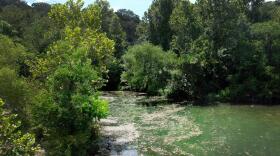Toxic blue-green algae has once again been detected in Lady Bird Lake.
The city says it's working to stifle the blooms that killed a handful of dogs in 2019. Next week, staff will treat the water at Red Bud Isle and on the northern banks of Lady Bird Lake east of I-35 with a nontoxic chemical that starves out the algae.
The algae contains a potent neurotoxin that can kill dogs and other animals. The city is warning pet owners to avoid the affected areas and to make sure dogs that go in the water don't lick their fur before rinsing off. The toxin can cause headaches, muscle weakness, nausea and even liver damage in humans, according to the Centers for Disease Control and Prevention.
On Monday and Tuesday, city crews will apply 30,000 pounds of Phoslock at each site. The cloudy chemical prevents the algae's ability to absorb phosphorus — a key food source for the algae. The city says Phoslock is not harmful to the environment or humans.
The city is asking folks on the water those days to avoid the barges staff will use to apply the chemical, adding that it will settle to the bottom of the lake within a few hours.
The city said the treatments will cost $300,000.
The algae has plagued Austin for the last three years. It was first discovered at Red Bud Isle, where it killed several dogs. Austin's hot and dry summers, combined with runoff from the Highland Lakes, create perfect conditions for the blooms. Cyanobacteria producing the neurotoxin in algal blooms flourishes in warm, stagnant water. It typically thrives in summers, then dies when waters cool down in the winter.
Austin has been testing along Lady Bird Lake since 2019. The city's Watershed Protection Department began treating waters with Phoslock last year.
The city says crews will reapply the chemical later this summer.














